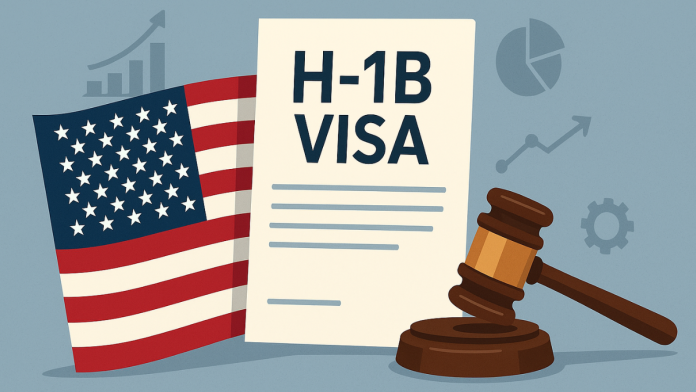The U.S. Chamber of Commerce has filed a major lawsuit against the Trump administration over a new $100,000 fee for H-1B visas. This move has surprised many businesses across the country. Before this change, the H-1B visa fee was only around $3,600. The new rule dramatically increases the cost for companies that hire skilled foreign workers.
The lawsuit was filed on October 16, 2025, in the U.S. District Court for the District of Columbia (Case No. 25-cv-3675). The case challenges a presidential order signed by Donald Trump that aims to restrict certain nonimmigrant workers from coming to the United States. The Chamber argues that this fee is illegal and harmful to businesses.
The H-1B visa program has been a key way for U.S. companies to hire workers in fields like science, technology, engineering, and healthcare. These workers fill jobs where qualified American workers are hard to find. The sudden fee increase could make it too expensive for many companies to hire these professionals, potentially slowing business growth and innovation.
Legal Arguments Against the Fee
The Chamber’s lawsuit claims that Congress, not the President, has the authority to set visa fees. The complaint specifically names the Department of Homeland Security, Secretary Kristi L. Noem, the Department of State, and Secretary Marco A. Rubio as defendants. The Chamber says the new fee ignores these rules and bypasses the law.
UAE and Saudi open doors with golden visas as U.S. prices out talent with $100K H-1B Visa cost
The lawsuit also points out that the fee was introduced without proper public notice or discussion, which is normally required under federal law. By setting such a high price, the Chamber argues the administration is forcing companies to pay an amount far beyond what is needed to process visas.
The complaint highlights that this fee could hurt smaller businesses and startups the most. These companies often rely on skilled workers to create new technology, develop healthcare solutions, or grow innovative products. A $100,000 charge for each visa could make hiring foreign experts impossible for many of them.
Legal experts note that the court has the authority to block the new fee if it is found to exceed the president’s legal powers. The Chamber cited previous court decisions, including Youngstown Sheet & Tube Co. v. Sawyer, to support their claim that the executive branch cannot rewrite laws or impose costs that Congress has not approved.
Business Concerns and Economic Impact
Businesses warn that the $100,000 visa fee could increase labor costs and reduce hiring. Companies that depend on foreign talent may struggle to continue operations or expand. Startups and small firms could be forced to cut projects or delay growth plans.
JPMorgan to Lobby Policymakers After Trump Slaps $100K Fee on H-1B Visas
Currently, roughly 730,000 H-1B visa holders work in the United States. They play a critical role in industries that rely on advanced skills, such as software development, medical research, and engineering. Companies say that without access to these professionals, innovation could slow down, and projects might move overseas where skilled workers are more accessible.
The Chamber emphasizes that H-1B workers not only fill important jobs but also create more jobs for American workers. Their work helps companies grow and increases wages. By making visas extremely expensive, the new fee could limit opportunities for both foreign and American workers.
The court case is expected to move quickly. The H-1B lottery for 2026 is scheduled to open in March, and companies need clarity on whether they must pay the new fee or continue under existing costs. Both the Trump administration and the U.S. Chamber of Commerce have remained cautious in their comments, but the case is seen as one of the biggest legal challenges to presidential power in immigration in recent years.


